Jul 2018
Seal Sitters protects and aids in capture of sea lion
Jul/18/18 06:04 PM
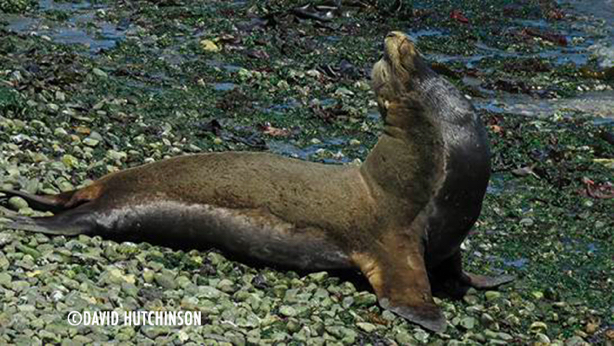 SEAL SITTERS VOLUNTEERS PROTECT AILING SEA LION
SEAL SITTERS VOLUNTEERS PROTECT AILING SEA LIONOn Friday the 13th, First Responders David & Eilene followed up on a hotline call and discovered a male California sea lion at Cove 1, the small beach just north of Salty's Restaurant (photo above). They noticed the animal was not using his rear flippers and moved with difficulty. His upper body was thin. He had not made the normal spring migration south, possibly due to these issues.
Seal Sitters sent photos to Dyanna Lambourn of WDFW Marine Mammal Investigations, who noted his distended abdomen and suggested the sea lion, nicknamed Dudley, was likely suffering from a fatal cancer. SR3 veterinary nurse Casey McLean arrived for a visual assessment.
Dudley swam away, but reappeared onshore at nearby Jack Block Park. Over the next four days under the watchful eyes of Seal Sitters volunteers, the terribly thin sea lion spent his time drifting in the waters close to shore and hauling out at different beaches. Steve Jeffries and Coral Pasi of WDFW came to observe and advise on Monday. It was agreed the best outcome for Dudley was a peaceful and natural death - and Seal Sitters would continue to monitor and keep him safe while on the beach.
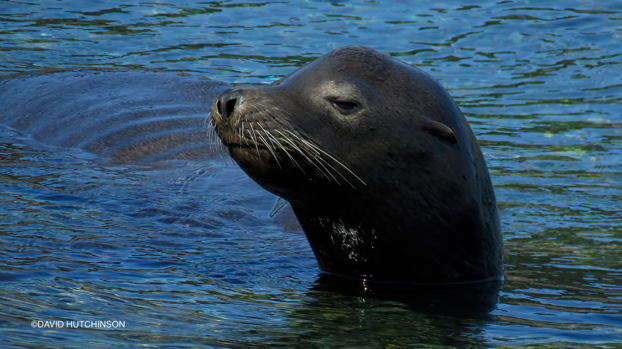 SEA LION CAPTURED AND TRANSPORTED FOR EVALUATION AND EUTHANASIA
SEA LION CAPTURED AND TRANSPORTED FOR EVALUATION AND EUTHANASIABy Tuesday, Dudley's increased penchant for hauling out at Cove 3, by the public fishing pier, began to pose a danger to himself and the kayakers, paddle boarders and visitors who used the popular the public beach. Seal Sitters called Steve Jeffries and plans for capture and removal were swiftly put into place. On Wednesday morning Dudley appeared at Cove 3 and settled in by the logs.
As Seal Sitters volunteers maintained the perimeter and talked to a crowd of onlookers who gathered at the railing, Steve and his crew including Jeff Harris of NOAA arrived with crowder boards, large cage and a boat with a drop-down ramp similar to a pickup truck tailgate. They made a successful capture, retrieved the boat at Don Armeni, and drove Dudley to the WDFW lab.
After an exam revealed the animal had severe health conditions he could not survive, he was humanely euthanized. A necropsy was performed the next day. While his condition is suspect for urogenital cancer, the exact cause of death won’t be known until the samples are analyzed. Seal Sitters will share information from the exam as it becomes available.
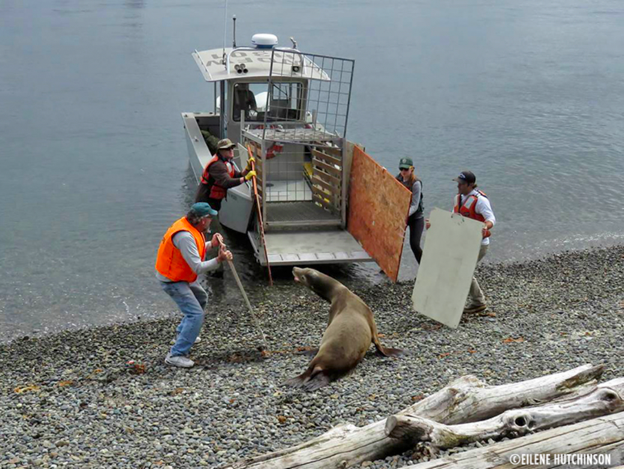 THANK YOU TO EVERYONE INVOLVED
THANK YOU TO EVERYONE INVOLVEDAlthough we are saddened that Dudley could not survive, we take satisfaction from knowing he was safe from harassment in his last days. We appreciate Greg and his staff at Alki Kayak Rental, who safely stowed some supplies needed for the capture and treated a persistent Dudley with patience and good humor. Many thanks also to our stranding network partner WDFW Marine Mammal Investigations, to NOAA and to SR3.
And finally, thanks to the many Seal Sitters volunteers who spent long hours watching, tracking and protecting this wonderful animal.
HISTOLOGIC REPORT
Histologic findings have corroborated the clinical observations and gross necropsy findings. This animal had a disseminated urogenital carcinoma. Sadly, urogenital carcinoma is common in wild California sea lions along the west coast of the U.S.
Fourth of July holiday no picnic for wildlife - stay back from seals
Jul/02/18 01:39 PM
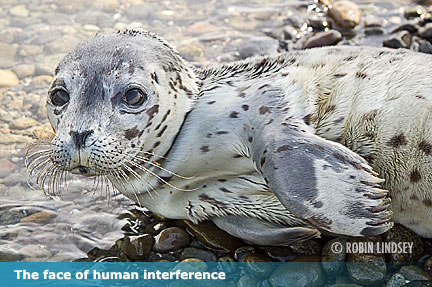
Harbor seal haulouts are full of pregnant females and newborn pups in Puget Sound and pups can be found all along the Washington coastline and inland waterways. Harbor seals also use jetties, breakwaters and log booms for haulouts.
Please stay a minimum of 100 yards away from resting seals. Like all marine mammals, they are protected from harassment by the Marine Mammal Protection Act and Washington State law RCW 77.15.130 (a criminal misdemeanor, mandatory court appearance, punishable with up to 90 days in jail and up to $1000 fine).
Pups pay a terrible price for human disturbance. The pup shown above was found in 2012, starving on Cutts Island, along with two other emaciated pups and several dead ones. All had been abandoned by their mothers because boaters disrupted the seal colony on this small island near Gig Harbor. A day of boating fun for people can be a death sentence for seal pups. During boating season, thousands of boats can be moored offshore at Cutts disrupting this historic harbor seal haulout (called a “rookery” during pupping season).
If you find a spot for your picnic on a beach near a harbor seal, please move your picnic to another beach. There are reports of people with blankets and coolers surrounding a lone seal pup - finally calling the stranding network wondering why the mother did not return. A harbor seal mom, shy and wary of humans, will abandon her pup if people and dogs are around! Use common sense and help protect wildlife from harassment.
If you are boating or kayaking, please stay far away from resting harbor seals. In 2010, we documented a speeding boat intentionally flushing seals from a protected island rookery with a sign posted “closed harbor”. In the photo below, you can see the boat scaring hundreds of seals from the beach, including pregnant females and many newborn pups. A female was giving birth right at that very moment and, terrified, she left her newborn pup, still in a bloody birth sac, alone on the deserted beach. The mom had no time to memorize the scent or call of her pup, which often leads to abandonment. Thankfully, a full 20 minutes after the boat left with the people onboard laughing, the mom returned to nurse her pup. More often than not, that pup would have been abandoned and slowly starved to death.
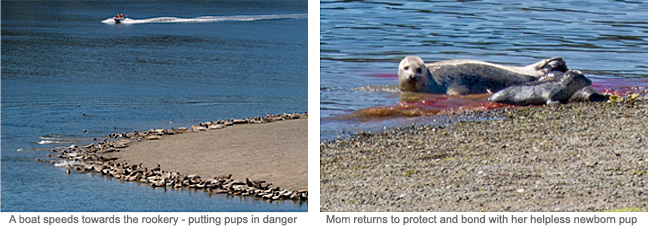
It is not a laughing matter to harass seals. It is a matter of life and death for seal pups. This incident was investigated by NOAA’s Office for Law Enforcement. Harassment is not just poking with sticks (yes, we have witnessed that) or scaring an animal back into the water - any change in an animal’s behavior caused by your presence is considered a “take” by law. This Federal law also prohibits touching, moving and feeding seal pups.
Many state parks on islands in the San Juans, Central and South Puget Sound have harbor seal rookeries. Do not approach animals by boat or by land. Please, be respectful and move your party elsewhere. If you see a violation, please call NOAA Office for Law Enforcement: 1-800-853-1964 and your local stranding network.
Boat launches and docks can have newborn or weaned pups sleeping on them or nearby, often in danger from propeller strikes or being run over by boat trailers. In some coastal areas, people are allowed to drive vehicles on the beach itself. On July 4th weekend in 2011, a pup was run over and killed on the beach at Ocean Shores - other animals, sick or weak and unable to move quickly, have been run over on beaches at Westport (California sea lion pup), Long Beach Peninsula (California sea lion), and Twin Harbors (adult harbor seal) at different times of the year. Please immediately report any pup (or adult) that is at a dangerous location or being harassed to your local stranding network.
Please be aware of your surroundings and give animals a break this holiday. Respect that harbor seals need to rest and nurse. Celebrate responsibly and you just might save the life of a seal pup. Fireworks are a moment’s thrill that can have heartbreaking consequences for wildlife.







